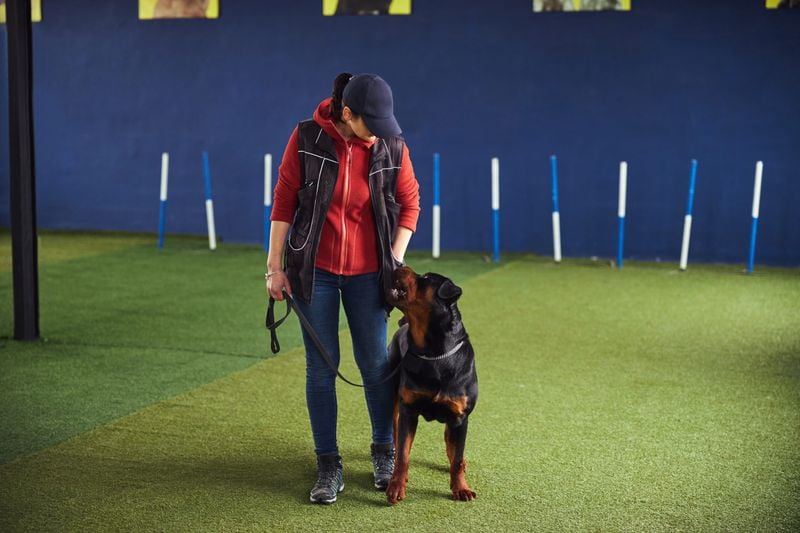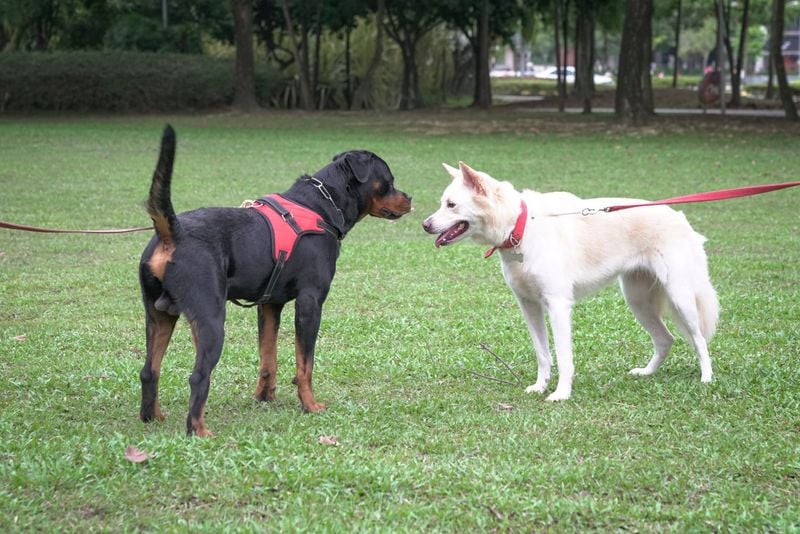12 Potential Risks of Adopting a Rottweiler You Should Consider
Adopting a Rottweiler can be a rewarding experience, but it’s essential to be aware of the potential challenges.
These dogs are known for their intelligence, strength, and loyalty, but they also come with specific requirements and potential risks.
Understanding these aspects can help prospective owners make informed decisions, ensuring a happy and healthy partnership with their Rottweiler.
Here’s a closer look at 12 potential risks you should consider before bringing a Rottweiler into your home.
1. They Require Experienced Handling
New dog owners might find themselves outmatched when dealing with a Rottweiler. These dogs don’t respond well to hesitation or vague commands. They’re observant and quick to take charge if no one else steps up.
Structure, discipline, and consistent training are essential. Without that foundation, a Rottweiler can become pushy, stubborn, or even aggressive when trying to assert control. Their strength makes this a serious concern.
Positive reinforcement works well, but they still need firm boundaries and someone who knows how to enforce them calmly. A first-time dog owner may simply not be equipped to lead this breed with confidence and clarity.
2. High Risk of Mislabeling and Breed Bans
Because of their muscular build and intense stare, Rottweilers are often misjudged as inherently dangerous—even when they’re well-behaved. This perception can lead to problems far beyond personal bias.
Many housing associations and insurance companies restrict or outright ban the breed. Even some cities and countries have laws that make ownership illegal or require expensive licensing and mandatory muzzling in public.
These limitations can create enormous headaches, especially if you move or travel. It’s heartbreaking to realize you may have to give up your dog due to a rule you didn’t expect. Always check local legislation before adopting a Rottweiler.
3. Can Be Overprotective Without Proper Socialization
Their loyalty is unmatched, but Rottweilers naturally see themselves as protectors. Without early, frequent socialization, that protective streak can escalate into overreaction or territorial aggression.
Strangers, delivery drivers, and even your friends might trigger defensive behavior if your dog hasn’t learned to read social cues. This can be particularly tricky in busy households or urban environments.
Proper exposure to people, places, and other animals from a young age helps them distinguish between real threats and harmless situations. Without that foundation, their instinct to guard may become a liability instead of a strength.
4. They Need a Lot of Socialization
Having a stable, well-adjusted Rottweiler doesn’t happen by accident—it takes effort. These dogs need ongoing social exposure from puppyhood through adulthood to develop the right temperament.
Just taking them to the dog park now and then isn’t enough. They need structured introductions to new people, places, sights, and sounds to avoid fear-based reactions later in life.
If they’re raised in isolation or left to guard a backyard, they can grow wary, defensive, or even unpredictable. Socialization isn’t a box you tick once—it’s a continuous commitment that takes time and consistency.
5. Prone to Joint and Bone Issues
Despite their robust appearance, Rottweilers are genetically predisposed to several musculoskeletal problems. Hip and elbow dysplasia are especially common and can cause chronic pain as early as middle age.
These conditions aren’t just physically taxing on the dog—they’re emotionally and financially taxing on the owner. Surgery, physical therapy, and pain management add up fast, both in cost and commitment.
Responsible breeders screen for these issues, but there are no guarantees. Adopting a Rottweiler means being prepared for the possibility of long-term orthopedic care and the lifestyle adjustments that come with it.
6. They Can Be Destructive When Bored
Boredom and a Rottweiler don’t mix well. Without enough physical activity and mental challenges, this breed will create its own entertainment—usually at your expense.
Chewed furniture, shredded cushions, and dug-up gardens are all fair game if they’re left under-stimulated. Their strength only amplifies the damage, and scolding after the fact does little to prevent repeat behavior.
Daily exercise, interactive toys, and obedience work aren’t optional—they’re necessary. A bored Rottweiler is a frustrated one, and that frustration can easily turn into destructive habits that are hard to break.
7. They Can Be Stubborn
While incredibly smart, Rottweilers aren’t always eager to please. They’re independent thinkers who often question commands rather than follow them blindly.
Training requires patience and creativity. Repetition alone won’t cut it—you need to keep sessions engaging and meaningful. If they get bored or disinterested, they’ll simply stop participating.
This stubborn streak doesn’t mean they’re untrainable, just selective in how they respond. Without the right motivation and consistent effort, your Rottweiler might learn to ignore you when it matters most.
8. Insurance and Housing May Be Difficult
Securing a home and insurance policy becomes more complicated when your pet is a Rottweiler. Many landlords and homeowner associations won’t rent or sell to people with the breed.
Even if you find pet-friendly housing, some insurers charge higher premiums or refuse coverage entirely due to their classification as a “high-risk” dog. This can leave you scrambling for alternatives.
Before adopting, it’s critical to check restrictions in your area. Otherwise, you may face heartbreaking choices if your living situation changes and your dog isn’t welcome anymore.
9. High Food and Maintenance Costs
Rottweilers aren’t cheap to maintain. Their large size means they eat more than smaller breeds, and they need high-quality food to support muscle mass and joint health.
Beyond meals, consider supplements, grooming tools, and regular vet checkups. Add obedience classes, durable toys, and unexpected medical bills, and the yearly cost can be surprisingly high.
Budgeting is crucial if you’re thinking of adopting one. Rottweilers are not a breed you can cut corners with—neglecting their physical or mental needs will only lead to bigger problems down the line.
10. May Not Get Along with Other Dogs
Rottweilers can be choosy about their canine company. While some get along fine with other pets, many exhibit same-sex aggression or dominance, especially as they mature.
Careful introductions and early socialization can help, but there’s no guarantee they’ll become best friends with your existing pets—or any new ones you bring home later.
This means you’ll need to be vigilant at dog parks, on walks, and during meet-and-greets. If you have a multi-dog household, compatibility isn’t a given and should be evaluated with expert help.
11. Intimidating to Strangers
Their sheer size, confidence, and deep bark can make even the friendliest Rottweiler appear threatening. For some people, the sight of one triggers fear before any behavior does.
This can impact your social life, limit playdates for your kids, or lead to uncomfortable confrontations during walks. Even neighbors may complain, regardless of how well-behaved your dog is.
You’ll need to be proactive in managing their public image—training, manners, and a visible leash or harness go a long way. But be prepared for judgment, even if it’s undeserved.
12. They’re a Lifelong Responsibility
Choosing a Rottweiler means signing up for a decade or more of dedication. These dogs form deep bonds with their humans and don’t cope well with change or neglect.
Their physical needs evolve, but their emotional need for structure, exercise, and attention never fades. As they age, mobility issues or health conditions often require extra care.
You can’t adopt a Rottweiler with the idea of figuring it out later. This breed demands long-term planning, stability, and a real commitment to being there through every stage of life.
















